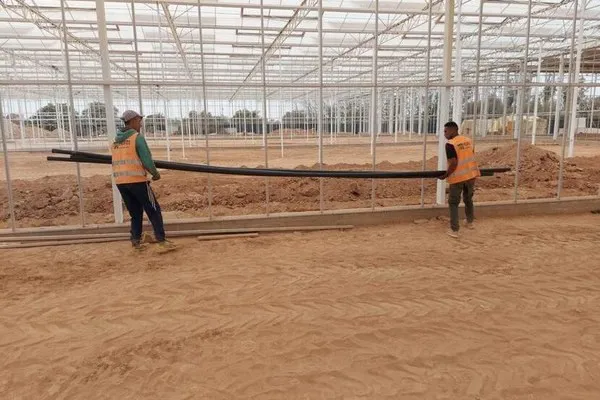Researchers (affiliated with the Leiden-Delft-Erasmus alliance), three Moroccan academic institutions, agriculture and horticulture companies, and governments from both countries are cooperating in order to sustain the Moroccan horticulture sector. A visit to Rabat and a Moroccan mission in The Netherlands underline the cooperative efforts.
On February 27, 2024, Annetje Ottow (President of the Executive Board of Leiden University and the Leiden-Delft-Erasmus alliance) will visit NIMAR which is a Leiden University Insitute in Rabat. This visit includes a roundtable discussion with representatives from the Leiden-Delft-Erasmus Centre for Sustainability, three Moroccan academic institutions – IAV Hassan II, IBN Tofail, and INRA - the Dutch embassy in Rabat, and a delegation from the Moroccan horticulture cluster.
The roundtable is the result of the declaration of intent that was signed in November 2023 in the presence of the Moroccan Minister of Agriculture, Dr Mohamed Sadiki. The declaration is a collaboration between IAV Hassan II and the Leiden-Delft-Erasmus Centre for Sustainability. It aims to develop an impact cluster with Dutch and Moroccan academic institutions, companies, and governments, to create a scientific agenda and launch educational activities for sustainable Moroccan agriculture.
Opportunities and co-creation for sustainable horticulture
In light of a growing global population, producing sufficient, healthy food without burdening the environment has become an important question. Sustainable, technological cultivation in greenhouses is part of the solution, for example in North Africa. Morocco is actively cultivating for the European market. Through joint research, Morocco aims to create opportunities to sustain its position. Moreover, it can provide opportunities for Dutch and other European entrepreneurs who search for ways to produce sustainably in greenhouses across borders or whose products can enable this. In Morocco, free solar energy and sustainable energy are readily available. Challenges mainly lie in the areas of water scarcity, salinization, and resilient cultivation.
Moroccan-Dutch collaboration
In 2023, the Dutch and Moroccan governments made agreements on more intensive cooperation (MOUs). There is an agreement on cooperation in the field of education, by Minister Schreinemacherj. As well as an agreement on cooperation in the field of water, by Minister Harbers. In Morocco, they consider the Dutch Greenport approach to be a model approach. This approach is a collaboration between businesses, governments, and academic institutions (including the Leiden-Delft-Erasmus alliance). The Moroccan-Dutch collaboration is a practical realisation of the internationalization strategy "Feeding and Greening Megacities". This is one of the strategies that is developed by Greenport West-Holland for a sustainable future of horticulture.

Construction of a demo greenhouse in Agadir. Photo: Agroberichten Buitenland
Optimal water management, closed chains, and resilient plants
The participating LDE universities aim to examine research issues in conjunction by complementing each other's expertise. TU Delft's knowledge about water management, ‘sensing’, and other technologies can lead to smarter greenhouses and regulation systems (with better irrigation and higher greenhouse yield). Erasmus University Rotterdam has expertise in chain and network cooperation that can contribute to less harvest loss as it can enhance product storage and transport speed. The Centre for Environmental Science Leiden brings in knowledge of environmental system analysis, that can measure impact. The Centre is also concerned with resilient cultivation and as such considers greenhouses as a balanced ecosystem in order to use fewer pesticides. The Moroccan academic institutions share their knowledge of local cultivation technologies and the local context. Dutch knowledge and technology are applied to Morocco's semi-arid and arid climate zones in cooperation with local partners.
Moroccan mission in the Netherlands
Following an invitation from Netherlands Enterprise Agency (RVO) 24, representatives of Moroccan academic institutions, sector organizations, and businesses will visit the Netherlands from February 13 unit February 15, 2024. The visit's program is created in collaboration with the Leiden-Delft-Erasmus Centre for Sustainability. It includes a meeting with Jaap Smit (Commissioner of the King South Holland) and Jaap Bond (chairman of the top sector Horticulture and Starting Materials). As well as meetings with scientists and companies operating within Greenport West-Holland.
The visit takes place within the framework of the 'combi-track policy'. Through this policy, the Dutch government intends to stimulate trade, investments, and development in fourteen emerging markets. Among other things, the policy is concerned with creating impact clusters where Dutch and foreign governments, academic institutions, and companies jointly conduct and practically apply research. The Moroccan visit ends with a seminar. The seminar is organized by Top Sector for Horticulture & Starting Materials and participants from the Dutch horticulture sector.
Source: Centre for Sustainability
